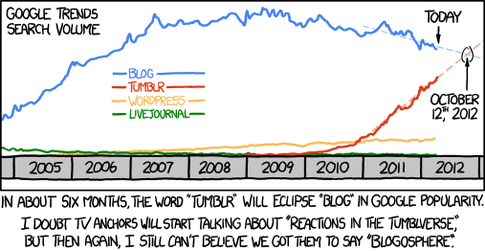
I guess Quora is another site that could eat up writing that previously would have gone on my blog. But writing prompts can be useful sometimes. When I saw this question, of course I answered: What are the consequences of Tumblr being more popular than blogs in search (as shown by Google Trends)?
The question is even accompanied by a cute drawing of the Google Trends chart:

I suspect this simply means that “Tumblr” is the new word a lot of people have heard but don’t know the meaning of – so they google it. I’m finishing up the second edition of my book, Blogging (Polity Press, 2008) so have been going through the history of blogging section today and so was reminded of how this worked when blogs hit prime time in 2004:
In 2004, “blog” was named word of the year by the Merriam-Webster dictionary, which reported that ‘blog’ was the most searched-for word on their online dictionary that year. By then, the media were writing about blogs regularly and almost everybody seemed to have heard about them. But in a survey late that year, 62 per cent of Internet users still said they didn’t know what a blog was (Rainie 2005). No wonder they were trying to look the word up in a dictionary.Having said that, “blogging” today can be seen as including microblogging on Twitter or Facebook as well as publishing on a Tumblr. It depends on your definition. I think the interesting this is the continued growth of open publishing online. People want to share their thoughts and the stuff they find online, and it really doesn’t matter if we call it “blogging” or “Tumbling” (?).
Actually if you check out Google trends by regions, there are already many more people searching for “Tumblr” than for “blogs”. But as you can see from the bottom section of the chart, the “news reference volume”, the news media mentions blogs far more often than they mention Tumblr, which supports my idea that people are searching for “Tumblr” because they have no idea what it means. Actually the charts for the UK and Australia look pretty similar, suggesting that Tumblr is a particularly big hit in English speaking countries.
In Norway searches for “blog” and “Tumblr” are almost equal now, but if you use the Norwegian spelling of “blog” (“blogg”) Tumblr is WAY below blog:
I don’t know any Asian languages so can’t easily check the trends there.
Related
Discover more from Jill Walker Rettberg
Subscribe to get the latest posts sent to your email.


